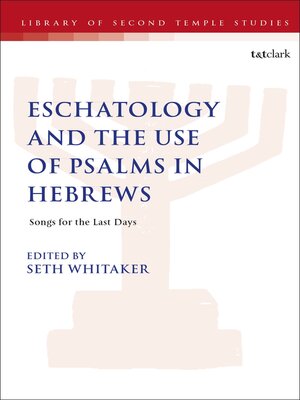Eschatology and the Use of Psalms in Hebrews
ebook ∣ Songs for the Last Days · The Library of Second Temple Studies
By Seth Whitaker

Sign up to save your library
With an OverDrive account, you can save your favorite libraries for at-a-glance information about availability. Find out more about OverDrive accounts.
Find this title in Libby, the library reading app by OverDrive.



Search for a digital library with this title
Title found at these libraries:
| Library Name | Distance |
|---|---|
| Loading... |
Seth Whitaker argues that the Psalm texts function as the structural and theological backbone of Hebrews from start to finish, and that few scholars have examined the use of Psalms outside of quotations or connected the author of Hebrews' use of Psalms with his broader eschatological outlook. Whitaker suggests that the author's eschatology is his dominating exegetical assumption, allowing numerous psalms to be read with multiple meanings.
Whitaker further suggests that Psalms, for the author of Hebrews, not only provide messianic material for his exegetical commentary, but also speak to a deeper interpretive tradition that is detectable through scriptural allusions, shared motifs, and narrative structures. Whitaker examines three passages of Hebrews, 1:5–13, 12:18–28 and 13:15, which correspond to three perceived gaps in scholarship: the relationship between quoted texts, the author's cultural encyclopedia, and the function of scriptural allusions. By focusing on Psalms and the eschatological nature of the author of Hebrews' exegesis, Whitaker concludes that readers will be better suited to situate Hebrews in relation to other Second Temple and early Jewish interpretive traditions.
Whitaker further suggests that Psalms, for the author of Hebrews, not only provide messianic material for his exegetical commentary, but also speak to a deeper interpretive tradition that is detectable through scriptural allusions, shared motifs, and narrative structures. Whitaker examines three passages of Hebrews, 1:5–13, 12:18–28 and 13:15, which correspond to three perceived gaps in scholarship: the relationship between quoted texts, the author's cultural encyclopedia, and the function of scriptural allusions. By focusing on Psalms and the eschatological nature of the author of Hebrews' exegesis, Whitaker concludes that readers will be better suited to situate Hebrews in relation to other Second Temple and early Jewish interpretive traditions.







